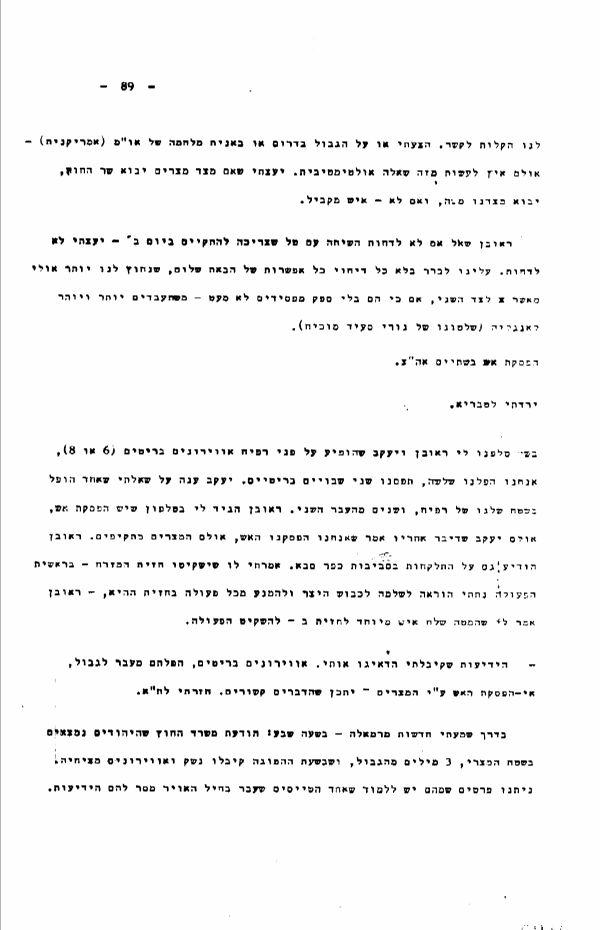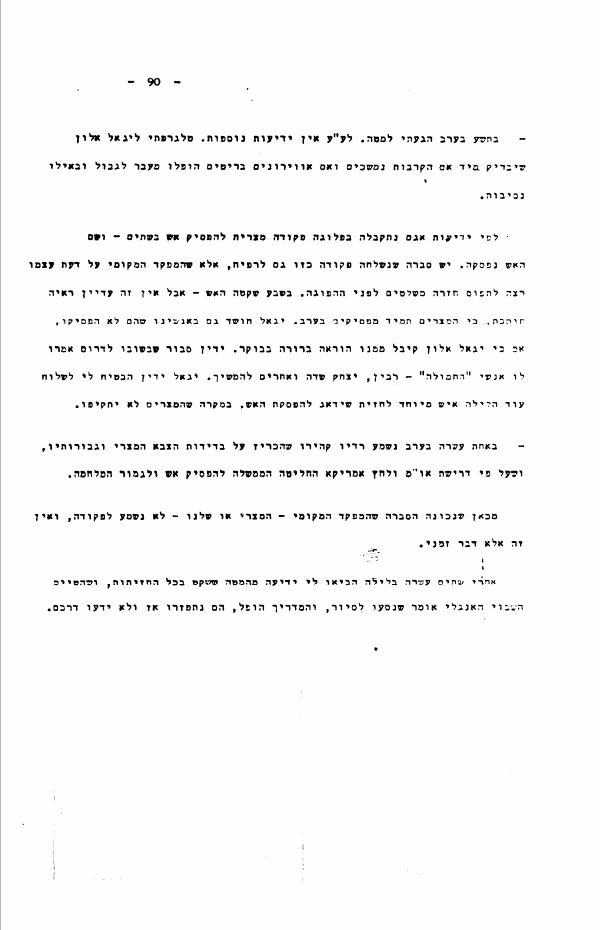Friday, January 7, 1949
In the morning - replied to correspondence.
Yigal Allon telephoned me. We didn't capture the crossroads [Rafiah Junction] but we do have the strongholds around it, so that the road to Egypt is cut off for the Egyptians. We are about 5 km south of the border. Yigal doubts there are POWs in the [Faluja] "pocket," but this morning Yeruham Cohen was sent to meet with the Egyptian commander, and if there are POWs - to inquire whether they can be exchanged.
Immediately after that I spoke with Yigael Yadin. An order was already issued to implement a cease-fire at 2 p.m. Our losses (aside from the "pocket" area) - 80 killed, 160 wounded. Near the "pocket" the number is not small - but it is not known exactly.
In Yigael Yadin's [opinion], the Egyptians will not be able (militarily) to maintain a hold on the coastal strip.
- Yigal Allon came to the Kirya [government compound] at my invitation. Yesterday [January 6] there was a terrible storm, and the instruments weren't able to function. The Egyptians fought bravely and met Yitzhak [Sadeh, 8th Brigade] with terrible anti-tank fire. They're always fighting bravely. The Egyptians were defeated only when they were misled or surprised. Yigal [Allon] believes that they removed their forces from Gaza (replaced them with locals) and these were who participated in the counter-attacks. According to Yigal there are 14 battalions between Gaza and Rafiah. They're positioned on the Gaza - Rafiah road 3-4 km eastward. The Egyptians have another approximately 3,000 men around Hebron - Jerusalem.
Our services worked well, including the Logistics Department [services]; the Medical Service, Engineering Corps, and Transport excelled in particular. Our Air Force sometimes hit our own soldiers - by mistake, because our forces were advancing rapidly. The Egyptian airplanes never struck; only our planes struck.
We lost one tank - it broke down [south of El-''Arish] and we destroyed it. About four of our armored vehicles were struck and burned; three armored vehicles reached the enemy and were damaged. We lost five-six half-tracks. We captured one "Spit" [Spitfire plane] - with ammunition.
I gave him an order to advance in the ''Arava [south of Hazeva] another forty-fifty kilometers southward, on the condition that they don't clash with anyone, and also to look for a path within our territory south of ''Auja.
In Rafiah the about 100 Egyptians were killed and 200 wounded, between ''Auja and Bir-''Isluj about fifty killed and many wounded, and there are about 600 POWs, including 25 officers (300 men from one battalion).
- Defense Committee meeting.
- In the afternoon [Henry] Vigier [from the UN base] came to the Defense Ministry. He'd received a cable from Bunche [saying] that negotiations with the Egyptians should begin immediately. The representatives, in his view, should be of the highest rank. The meeting would take place somewhere neutral - he was thinking of Armon HaNatsiv earlier, but one of the parties would not feel right there (there's no direct access to Egypt) and therefore he proposes Rhodes. I objected to Rhodes, which is England, and signal [communication] would not be easy for us. I suggested either on the southern border or on a UN (American) warship - although this question should not become an ultimatum. I suggested that if the foreign minister were to come from the Egyptian side, Moshe [Sharett] would come from our side, and if not - someone who is a counterpart.
Reuven [Shiloah] asked whether the conversation with al-Tall that is supposed to take place on Monday [January 10] shouldn't be postponed - I advised not postponing it. We need to inquire without any delay as to any possibility of bringing peace, which may be more necessary for us than for the other side, although they are undoubtedly suffering not insignificant losses - becoming increasingly enslaved to England ([as] Nuri Sa'id's government [in Iraq] is proving).
- At 2 p.m. cease-fire.
I left for Tiberias.
At 6 Reuven [Shiloah] and Ya'akov [Dori] telephoned me [to say] that British airplanes (6 or 8) had appeared above Rafiah, we downed three, captured two British POWs. Ya'akov, in answer to my question, replied that one was downed in our section of Rafiah [in the Rafiah sector], and two on the other side. Reuven told me over the telephone that there is a cease-fire, but Ya'akov, who spoke after him, said that we ceased firing but the Egyptians are attacking. Reuven also reported on a flareup around Kefar Saba [in the Tira - Ramat-HaKovesh sector]. I told him that they should quieten the Eastern Front - at the start of the action I had instructed Shlomo [Shamir] to practice restraint and avoid any action on that front. Reuven told me that the Staff will send someone special to Front B [the Eastern Front] to subdue the action.
The reports I received worried me. British airplanes, being downed across the border, no cease-fire on the part of the Egyptians - it's possible these things are linked. I returned to Tel Aviv.
- Along the way I heard news from Ramallah - at 7: the [British] Foreign Office reported that the Jews are in Egyptian territory, 3 miles from the border, and that during the truce they received weapons and airplanes from Czechoslovakia. The details provided indicate that one of the pilots working in the Air Force had given them the information.
- At 9 p.m. I reached the Staff. For now there's no more news. I telegraphed Yigal Allon to cable immediately whether the battles are continuing and whether British airplanes had been downed across the border and under what circumstances.
According to Operations Department reports, an Egyptian order was received in Faluja to cease fire at two - and the fire was ceased there. It's reasonable to assume that such an order was also sent to Rafiah, but that the local had opted on his own accord to retake strongholds before the truce. At seven the hostilities stopped - but this is not yet decisive proof - because the Egyptians always stop in the evening. Yigael [Yadin] also suspects that our men didn't stop, although Yigal Allon received a clear order from me in the morning. Yadin thinks that upon his [Allon's] return to the south, members of the "clan" - [Yitzhak] Rabin, Yitzhak Sadeh - told him to continue. Yigael Yadin promised me that he would send someone special to the front tonight to ensure a cease-fire, in the event that the Egyptians do not attack.
- At 11 p.m. Radio Cairo could be heard declaring the isolation of the Egyptian army and its heroism, and [stating] that in accordance with the UN's demand and American pressure, the government decided to implement a cease-fire and end the war.
From this it follows that the presumption is right regarding a local commander - Egyptian or ours - who did not follow orders, and this is no more than something temporary.
After midnight I was brought a message from the Staff that all the fronts are quiet, and that the captured English pilot said that they had been conducting a reconnaissance flight, and the guide was downed, so they got scattered and lost their way.












